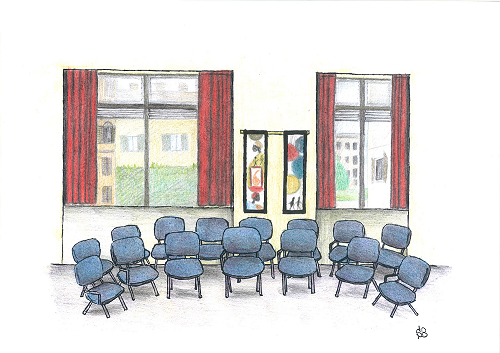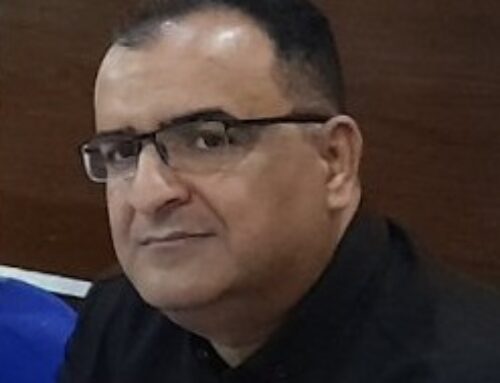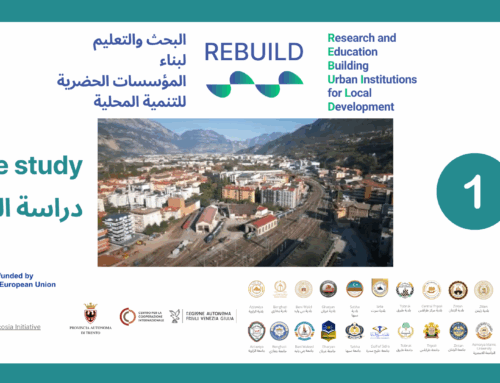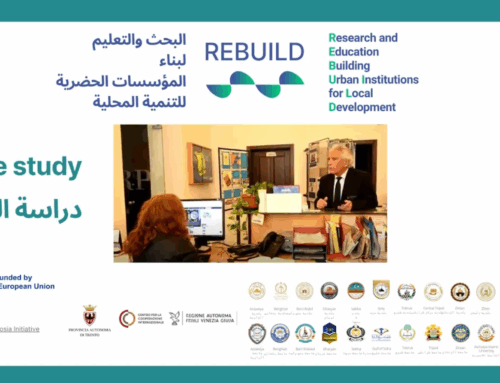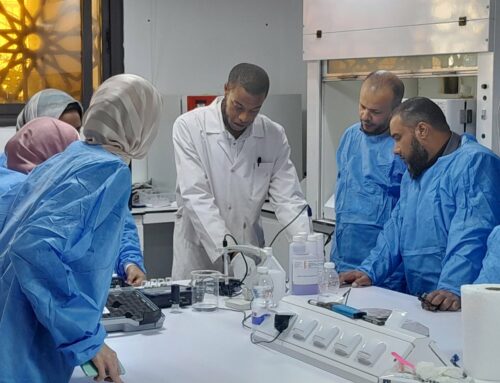Coordinating and managing the REBUILD training process has represented for CCI an opportunity to be in charge of a comprehensive capacity building process based on local development, in particular on the concept of TALD (Territorial Approach to Local Development). This opportunity comes from the collaboration with Profadel network and the training partner Ciedel in the framework of the continuous learning process of the Nicosia Initiative from 2018 to 2020.
The REBUILD capacity building process started in October 2021 and ended in February 2025. It included:
- the main training process, constituted of seven training cycles
- the establishment and management of a community of practice.
Additional training activities were implemented within REBUILD pilot projects; the CCI training team was not directly involved in the training engineering activities.
REBUILD training process
Curriculum. The training process was structured on a training curriculum divided into 7 cycles and each cycle divided into 3 Modules:
1. PROMOTING SUSTAINABLE AND INCLUSIVE LOCAL DEVELOPMENT
2. PROMOTING DEMOCRACY THROUGH LOCAL GOVERNMENTS
4. LEADING AND MANAGING PEOPLE
5. PROMOTING SOCIAL ECONOMIC DEVELOPMENT
|
Each cycle included a methodological module on adult training, experiential learning.
Cycles 1 to 6: each cycle lasted 6-months. The whole process is composed of:
- Training of trainers. Overall CCI prepared 75 on-line video lessons and organised 14 on-line meetings, It also organised 6 weeks of in-presence training (Tunisia, Tripoli, Benghazi).
- Training by each Libyan university to the staff of the Libyan municipality. The training to municipalities included for each cycle 72 hours of training delivered by university trainer(s).
| Number of municipality staff trained: 1.177 (women: 32%)
4,320 hours of in-presence training (72 hours * 10 cities * 6 cycles) |
At the beginning of the project, in November 2021, CCI prepared preliminary “Module 0”, introducing the training process mechanism, the main topic (Territorial Approach to Local Development – TALD) and a presentation of Trentino territory and institutions.
Cycle 7 was delivered only on-line.
Delivery and support to CCI in training engineering and implementation:
Cycles 1, 4, 5, 6, 7: coordinated by CCI, implemented by Ciedel and CCI
Cycle 2: coordinated by CCI, implemented by Alda and CCI
Cycle 3: coordinated by CCI, implemented by CCI
Evaluation of each training activity was conducted by CCI.
Very useful support was offered to CCI by REBUILD Coordinator in Libya in:
- fine-tuning the curriculum to Libyan context
- identifying experts contributing to the TOT (both on-line and in-presence)
- smooth implementation of the in-presence TOT, especially when implemented in Libya
- validation of the municipalities’ participants to training
- coordination with the Ministry of Local Government (MOLG) and its training centre (MDDSC).
| Lessons learnt:
Technical partner(s): Importance to have experts with knowledge on the Libyan context and regulatory framework. Importance of a reliable and timely cooperation Choice of topics Importance of working on both technical and methodological topics Importance of adapting the training materials to Libyan context in terms of priorities, legal framework, organisational setting, financial resources available. Practical training. Importance to provide case studies to be pragmatic and bring experiences close to the participants’ experience. Importance bringing case studies and real experiences as it is expected as added value of the international cooperation framework. Choice of training material/approach On-line training material (for TOT) should consist of:
E-learning platform: very useful repository, not easily accessible, especially for municipality staff. In presence training Before the training: participants are invited to prepare (group) presentations. During the training: provide exercises + discussions + group working + Ice breaking + energizers and brainstorming on adult learning methods. Choice of trainers Importance of the choice of the trainer in the university with competencies both on the topic and on the adult training methodologies or at least willingness to adapt its training approach. Choice of participants importance to have participants: 1. with experience on the functioning of the municipality; 2. coherence between training topic and their duty/responsibilities in the municipality |
2.2 REBUILD community of practice
The Community of practice within REBUILD represents a “networking tool” connecting all activities: it is the space where partner municipalities/universities meet and exchange experiences and build competences on local governance. It is also a way of implementing the REBUILD project itself, an experiment of participation of all partners, with space and opportunities for submitting proposals and therefore for dialogue.
The main activities have been:
- the organisation of 2 Summer school in Trento (Italy) and Lyon (France) and a Winter school in Trento.
- Regular partners’ meetings on project management and for exchanging practices on local development.
The community of practice, coordinated by CCI, was originally intended as a process with unclear activities: in 2020 there was still tension/conflict in Libya, and Covid worldwide. We did not know the degree of feasibility of any international trip or trips across different regions within Libya. The only clearly defined activity was the organisation of two summer schools. No other activity was budgeted for in the REBUILD community of practice.
Eventually, the Community of practice has been active since early 2022 when: 1. on-line regular meetings with partners started to take place; 2. the organisation of the first Summer school kicked-off; 3. the first Technical Board meeting was organised (Tunis, March 2022). Arabic-speaking training expert highly facilitated in this process.
| Lessons learnt:
Effectiveness On-line technical exchanges and meetings are moderately useful, although in some cases, when based on clearly defined experiences, close to the Libyan context, they have been highly appreciated. In presence exchanges, like summer schools, are much more appreciated and, probably, more effective although we are not able to assess its effectiveness/impact. |
- REMARKS FROM LIBYAN PARTNER UNIVERSITIES
- The project has achieved remarkable positive results, as it contributed to enhancing the skills and knowledge of trainers from universities as well as employees from municipalities.
- it was able to open a channel of communication and interaction between the university and the municipality
- Forming a core of trainers (6 in each university) who will be used to implement other training programmes in the future.
- Strengthening teamwork between Libyan universities (exchanging experiences in the field of training)
- Sustainability: new training centers (dedicated to training municipality staff) were established at Gharyan University, Sidra Gulf University, and Zawiya University, Sabha University
- Activate the collaboration between university professors and the Municipal Development Support Service Centre (MDDSC) of MOLG and its local branches.
- Enhancing the term “stakeholders” at the university by presenting suggestions that everyone affected by any decision issued by the university should be consulted. For instance, the university now has a student committee called the Sustainable Development Committee that conducts activities and leads events.
- A significant difference between the REBUILD project and other projects within Libyan universities is that REBUILD includes the translation of the project into Arabic, either through documents or during meetings and training sessions.
- Linking universities to the practical reality in their municipalities and moving from the academic environment to field work and interaction with the municipal council
- The community of practice had a positive impact, as transferring successful experiences in water and waste management.
- On a personal level (behavioral skills): inspired by the leadership style of the REBUILD project in terms of communication, consultation, patience, and their approach to the numerous and difficult problems we faced.
- FINAL REMARKS
CCI succeeded in managing, coordinating and delivering a local development capacity building process in Libya, a context CCI was not familiar with and which poses a number of challenges in terms of fragility, security and with a significant language barrier.
Through REBUILD, during these years CCI has had the opportunity to increase its expertise on Territorial Approach to Local Development (TALD), on adult learning and on facilitating a community of practice in a multicultural environment. The whole CCI team is grateful to the Libyan partners for the opportunity to work with you during the last four years: motivated, competent and kind colleagues in Libyan universities and municipalities. Looking forward to new opportunities to work together…

